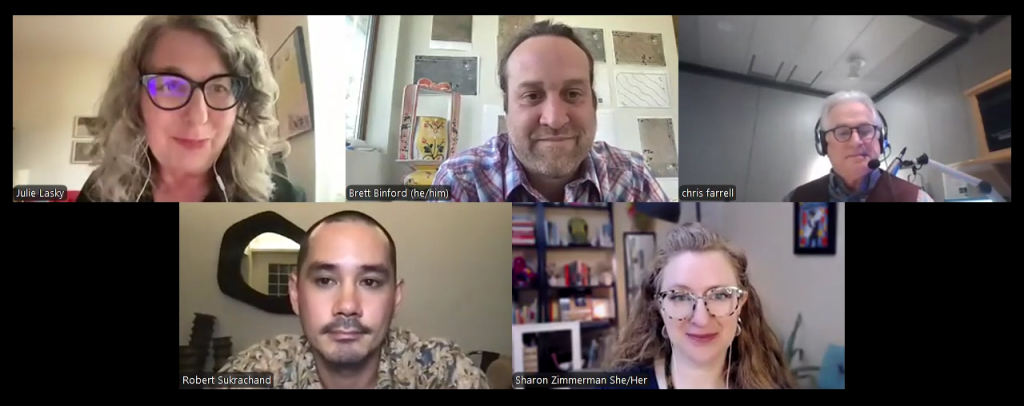
US makers claim the new tariffs will damage a respectful and beneficial relationship with makers in other countries.
On 6 May, the American Craft Council, in partnership with the Furniture Society and the Craft Emergency Relief Fund, hosted a panel discussion titled “Craft in a Time of Tariffs: Implications and Possibilities for American Makers.” While much of the focus was on the impact of tariffs on the supply of craft materials from other countries, concern was expressed for relationships with foreign makers in general.
Participants included Chris Farrell, senior economics contributor for Minnesota Public Radio News and American Public Media’s Marketplace; Robert Sukrachand, Brooklyn-based designer and artist; Sharon Zimmerman of Sharon Z Consulting, a craft-based small business consulting firm; and Brett Binford, artist and co-owner of Mudshark Studios. This program was run by Julie Lasky, a journalist for The New York Times, The Wall Street Journal, and many others, as well as a part-time assistant professor in the Industrial Design MFA program at Parsons School of Design.
Robert Sukrchand explicitly stated that the administration’s protectionism “demonises offshore human labour and at least those who produce in Asia in partnership with American small businesses”. He pushed back against the reductive discourse that framed overseas manufacturing solely in terms of “cheap labour, cheap materials, cheap prices”.
[Foreign] artisans bring “a rich material heritage or a special skill set or creative possibilities that we couldn’t achieve on our own”.
The speakers highlighted that they work with craftspeople in countries like Thailand and India, not just for lower costs, but because these artisans bring “a rich material heritage or a special skill set or creative possibilities that we couldn’t achieve on our own”. This includes “generational knowledge” and significant investments in innovation and technology where other countries are “light years ahead of us”…. Sharon Zimmerman mentioned sending laptop sleeves to China because they “simply have the technology”. The tariffs impact these skilled partners.
Chris Farrell noted that the situation was causing businesses to “break established relationships in order to forge new relationships that didn’t involve tariffs”, which affected connections with places like Europe and China. This suggests tariffs directly harm existing partnerships with foreign makers and suppliers.
US makers rely heavily on inputs sourced from overseas, which are often “really well-made and really efficiently made”. Robert highlighted that technical components for lighting are literally not made in the US at the necessary quality or price, meaning they must be sourced internationally. Sharon noted that key materials like diamond cutting are concentrated in places like Gujarat, India, due to specialised knowledge. Tariffs on these essential inputs directly impact the foreign producers as well as the American buyers.
Chris Farrell and Robert Sukrchand strongly argued that international craft trade is “not a zero-sum game”. Instead, it’s about the “gains to trade,” the “exchange of knowledge,” and the “exchange of skill”, leading to a “symbiosis that happens of ideas and innovation coming from our side, combining with manufacturing in different places or vice versa”. Tariffs are considered “stupidity” because they harm this mutually beneficial exchange.
Sharon Zimmerman mentioned concerns that tariffs could impact responsible sourcing efforts that often involve traceable materials from countries like Peru. Cuts to US government departments like USAID and the Department of Labor were also noted as harming international monitoring of responsible sourcing.
While the speakers acknowledged issues like copying and intellectual property theft by factories in China that they wished could be addressed, their primary concern regarding the tariffs themselves was the damage they inflict on valuable, often skilled, and sometimes irreplaceable relationships and supply chains with foreign artisans and manufacturers.

